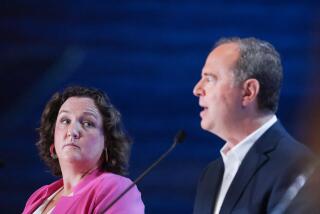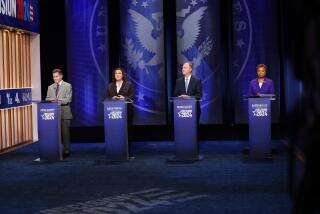Arms Dealers, Not Contras, May Have Got Iran Profits
- Share via
WASHINGTON — Profiteering by arms brokers and middlemen substantially reduced the amount of money from the secret Iranian arms sales that was available to provide military assistance to the Nicaraguan contras, members of the Senate Intelligence Committee said Tuesday.
Chairman Dave Durenberger (R-Minn.), whose committee has held more than a week of closed hearings on the matter, told reporters that the panel has been unable to substantiate Atty. Gen. Edwin Meese III’s allegation that between $10 million and $30 million in profits from U.S. arms sales to Iran went directly to the anti-Sandinista guerrillas.
In fact, Durenberger said no evidence has been found so far that the contras received any cash from the transaction. He said officials of the Central Intelligence Agency have told the panel that the military supplies received by the contras from U.S. sources over the last year did not reflect a large infusion of money from Iranian arms sales.
“The CIA witnesses who are responsible for that have gone over with us the amounts and the kinds of lethal equipment, and it is they who come to the conclusion that they couldn’t see the evidence of any substantial sums of money,” he said.
The testimony of those officials is consistent with the recent statements of contra leader Adolfo Calero, who said that the amount of military aid provided to the Nicaraguan resistance through private U.S. channels over the last year amounted to far less than $10 million.
When asked if middlemen could have pocketed some of the money, Durenberger replied: “There is a markup, if you will, over cost. The various parties in this have shared in that markup as payment for these services . . . . A lot of brokers, as we might call them, were involved in this process along the way--obviously they were compensated to some degree.”
Although contra leaders have charged that Americans involved in the supply operation were raking off money for themselves, committee sources said Durenberger was referring primarily to profiteering by the arms merchants who arranged the transaction with Tehran.
Sen. William S. Cohen (R-Me.), a member of the committee, added that there is evidence that profits earned by these middlemen were excessive. “There have been a number of statements made by various witnesses (about) how prices started to get escalated,” he said.
To Phone White House
A spokesman for Durenberger said the senator planned to telephone the White House to try to speed the delivery of National Security Council memoranda requested by the panel Friday. Durenberger had said Monday that he would give the White House 24 hours to deliver the documents, which he described as crucial to filling information gaps resulting from the refusal of the main participants in the arms deal to testify.
Both Durenberger and Sen. David L. Boren (D-Okla.), who will become chairman of the committee when Congress reconvenes on Jan. 6, indicated that the panel’s investigation is focusing on the route the money took from Tehran to the jungles of Nicaragua.
On Tuesday, retired Air Force Maj. Gen. Richard V. Secord was summoned before the committee to answer questions about his alleged role in the contra supply effort. However, he refused to testify on grounds that it would violate his constitutional rights against possible self-incrimination, making him the fourth committee witness to invoke the Fifth Amendment.
Meanwhile, it was learned that the committee has subpoenaed records from Stanford Technology Trading Group International Inc., a Virginia-based firm partly owned by Secord that was involved in the contra supply operation, and has summoned a key employee of that firm, Robert Dutton, to appear before the panel today.
Arms Markup Cited
Contra leaders have charged that Secord’s company charged a markup of as much as $50,000 for each planeload of goods delivered to the contras, but Durenberger said he has no evidence that Secord profited in any way from the supply operation.
Boren said the money trail is at “the heart of determining whether or not violations of law have occurred and who violated the law.” In addition, he indicated that he was by no means satisfied with what the committee has learned so far.
“We must continue to track the chain of where the money went,” he said. “How much money was there? Who received the money? When did they receive it? How was the money transferred?”
Durenberger indicated that the committee’s investigation of the money route has been hampered because three key witnesses--Secord, former White House National Security Adviser John M. Poindexter and his former aide, Oliver L. North--have all invoked the Fifth Amendment.
How Much Did Contras Get?
“We don’t know how much money the contras got, if they got any at all, at this stage,” he said. “No one . . . has proven yet that the contras ended up with any money, which is the heart of one of the allegations of the attorney general of the United States that funds had been diverted” from the Iranian arm sales to the contras.
Durenberger said that the “first person who steps forward and proves that the contras got any money provides a valuable thing to this country.”
Cohen added: “We haven’t got a complete fix on how much went in, how much came out and where it went to . . . . If it went into somebody else’s pocket, we don’t know that. We don’t have a real fix on how much money is involved.”
Also appearing before the committee Tuesday was Michael Ledeen, an expert on terrorism who worked as a consultant to North during his tenure on the National Security Council staff.
Hatch Favors Immunity
The committee members, continuing to meet in closed session, argued over whether to offer immunity from prosecution to those witnesses who have refused to testify. Sen. Orrin G. Hatch (R-Utah) argued strenuously in favor of immunity; Boren strongly opposed it.
None of the witnesses have yet requested immunity from prosecution, and Durenberger reported that no decision on whether to grant it has been made by the committee.
Boren argued that the committee would harm the Administration if it grants these former aides immunity, especially if it can be proved that the President had no knowledge of the diversion of Iranian funds to the contras.
“What in the world would the American people think of the committee if prematurely we, in essence, built a fence around some of the people who might prove to be the most guilty--in fact, that might have even done a disservice to the President?” he asked.
No Evidence Against Reagan
Boren emphasized that the committee’s investigation so far has turned up no evidence of any serious wrongdoing by the President.
Durenberger’s decision to conduct an immediate investigation by the Senate Intelligence Committee has drawn criticism from many members of his own party who believe that the matter should be reserved for a select Senate committee to be appointed next week. But the chairman defended his move on grounds that the panel is creating a record for future investigators.
More to Read
Get the L.A. Times Politics newsletter
Deeply reported insights into legislation, politics and policy from Sacramento, Washington and beyond. In your inbox twice per week.
You may occasionally receive promotional content from the Los Angeles Times.











